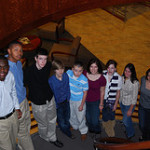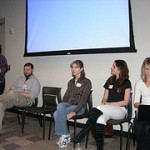The third session I participated in was Teaching College Science: Blogs and Beyond moderated by Brian Switek, of Laelaps and Dinosaur Tracking, and Andrea Novicki, at Duke’s Center for Instructional Technology. Brian “live blogged” the conference notes onto the session’s Science Online wiki page. The audience was split into groups of 4 where were we were tasked to come up with three ways blogs could be used in teaching. The three examples from our group was
1) Using OpenScience software and online lab notebooks/field journals. Keeping it all online enhancing sharing and prevents any one individual from falling behind because of lack of appropriate software. Even programs such as Google Docs or OpenOffice can help break the software ceiling for many struggling school systems
2) Blogs used in homeschooling, i.e. exploring school subjects through blogs. There is a wealth of information, lessons, video, mulitmedia and case studies out there for free waiting to be exploited. One group member mentioned that critical thinking can happen in the comments sections. Following the links to explore the web can facilitate students finding their interests. While kids respond more readily to online materials, web surfing presents hazards. How to keep on track during navigation. Coincidentally, John Wilkins of the Evolving Thoughts blog has been dutifully cataloging Basic Concepts posts. If you write about a basic concept in the sciences, I strongly encourage you to send it in for review and cataloging with his collection. Such posts make an excellent starting material (potentially an entire course) for further learning, whether homeschooling or not.
3) Peer-to-peer communication among students and between students and instructors. This might not necessary be done best in a blog, but perhaps a wiki, friendfeed room or twitter.
These were but only a small fraction of the ideas that went around the room. The participants were composed of a wide variety of backgrounds from educators, scientists, journalists, high school, undergraduate and graduate students, techies and “other’. I encourage to view the rough notes on the wiki. This was a great session to attend right after the high school student perspective as it dealt with many of the same issues, but expanded upon some of them.






It was your blog that encouraged me to start blogging and yours is still one that I return to again and again. Thank you!
deepseanews.com – cool sitename man)))
Thank you for attending this session and contributing; you had good ideas and perspectives. I especially liked your example of having students produce blog posts while they are on a field trip; this can make for a more reflective, rich experience for the students.
We’ve posted a brief write-up of this session on Duke’s CIT blog. I’ve linked to it, above.
Hello, I can’t understand how to add your blog ( deepseanews.com ) in my rss reader
————————
internet signature: http://paul1on.far-cry-far-cry-2.ru
Hi Drersetep, On the left side under the photo of the submersible is an orange RSS icon with the word “Subscribe!” next to it, just click on that icon to open up a list of options for bookmarking our blog. Thanks for stopping by!
stimulating and communicative, but would make something more on this topic?
Can’t really say anything, as far i haven’t seen any college doing it, Good idea, though.
Cheers.